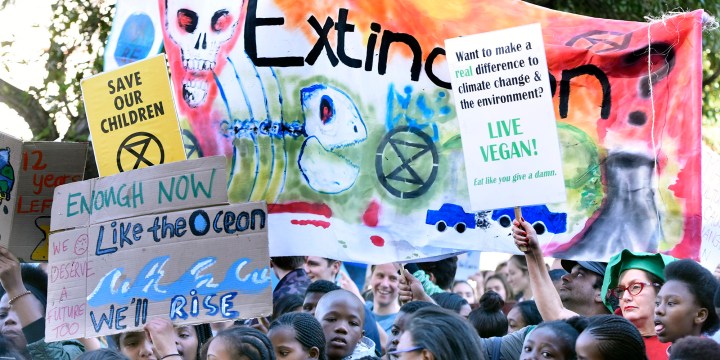Global Strike Countdown
The climate emergency: Disruption and rebellion are now a matter of life and death

The taken-for-granted, business-as-usual world, is upside down. We now live in a world where the self-destruction of capitalism (a good thing) and all living life forms (a terrible thing) are integrally connected. The destruction of everything is becoming a realistic prospect as global climate heating and breakdown intensifies. To stop the destruction of everything, we have to go beyond capitalism.
Consider some of the recent facts.
The temperatures in July were the hottest ever recorded. Alaska’s sea ice melted for the first time in recorded history. Hurricane Dorian, the strongest storm to make landfall in the Bahamas, left in its wake massive devastation, thus far 50 people dead and a big debt.
Western Europe, with France mainly bearing the brunt of a recent heatwave, also broke historical records. A drought is spreading across big parts of France.
In Africa, water stress related to heating temperatures is affecting millions in the Sahel, Kenya, Somalia, Zimbabwe and parts of South Africa. According to some estimates 200 million people in Africa will be displaced by continued heating in the coming decades. Forced mass migration requires human solidarity, not xenophobia. It requires a climate justice understanding of how climate shocks will hit the poorest countries and communities the hardest, yet they did not create this problem.
Much of this crisis is driven by carbon dioxide emissions of big polluting countries and industries. A bit of background here will help you understand the crisis.
In July 1958, Dr Charles Keeling started measuring the amount of carbon dioxide in Earth’s atmosphere. His research confirmed that more and more carbon is concentrating in the Earth’s atmosphere, contributing to the “greenhouse” effect. The growing volume of carbon in the atmosphere traps more of the sunlight hitting planet Earth and this induces heating. More carbon in the atmosphere means more heating.
Back in 1958, Keeling’s initial measurement placed carbon concentration at 313 parts per million (ppm). Scientists consider 350 ppm a safe threshold to secure a stable climate. We are now at 415.70 ppm, the highest concentration of atmospheric CO2 in human history. Because of US President Donald Trump’s flagrant denialism, in 2018 we saw soaring carbon emission again – in the midst of the crisis.
He is preparing the perfect storm for the world.
But as we know, Trump has his fans and followers amongst the new right emerging in the world.
Again, in defiance of the science, the slash and burn modernising approach of President Jair Bolsanaro of Brazil is destroying the equivalent of three football fields every minute in the Amazon. One of the world’s most important green lungs, containing 120 billion tons of carbon locked into trees, is being incinerated to advance carbon-centric (oil, gas and coal) industrial farming, mining and logging.
For over two decades the world’s leading climate scientists have warned about the dangers of climate change and breakdown through the United Nations International Panel on Climate Change (IPCC). The UN 1.5 Celsius report released in October 2018, raised the alarm bells the loudest. It confirmed our world had changed fundamentally. There has been a 1°C increase of temperatures since before the industrial revolution. As a result, the report warned, extreme weather shocks will become our new normal. Increasingly the relatively stable climate we have had for about 11,000 years is being disrupted.
South Africa is becoming a frontline for the climate crisis
In South Africa, on 23 October 2018, the SA Food Sovereignty Campaign wrote an open letter that called on President Cyril Ramaphosa to convene an emergency sitting of Parliament to deliberate on the UN 1.5°C report and its implications for South Africa’s climate policy and just transition. Ramaphosa didn’t respond. Instead, he chose to feign concern and alarm when a “rain bomb” and consequent flooding killed about 70 people in April 2019 in Durban.
Events like this, as well as the drought that still ravages parts of South Africa, confirm we are living in a climate emergency which needs political leadership that understands the imperatives that come with this reality. The scientific observations about our planet’s climate are now registering in everyday life.
Let me be clear, calling for recognition of the climate emergency by the government is about validating the science and affirming clear policy commitments to advance just transitions that will place the interests of workers, the poor, the vulnerable and eco-systems at the centre of socio-ecological transformation. It is about staying within an ambitious carbon budget.
Thus far, South Africa’s national plan seeks to reduce emissions from 500 million tons annually and which is meant to be limited in aggregate to 14 gigatons of carbon in total by 2050. This is likely to be undermined, given our addiction to fossil fuels. As the science of climate change warns us, this plan is not ambitious enough. We need to deepen people-driven leadership of such a challenge and our nationally determined carbon budget.
Moreover, such a state has to be driven by democratising logics from below in households, communities and workplaces that are advancing just transitions.
Embracing climate justice domestically is also about advancing such commitments at the Southern African Development Community, the African Union and the United Nations. It is about recognising the common cause to stop the risk of extinction of all life on planet Earth.
Put differently, recognition of a climate emergency should not be about suspending the Constitution, rights and democratic accountability. Such an approach to the climate emergency ignores the history of “states of emergency” in South Africa that used the logic and argument of a state of exception to further brutalise and oppress the majority. In the shift towards authoritarian neo-liberalism and neo-fascism in the world, calls for climate emergencies that deny people-led democratic politics are extremely dangerous.
Moreover, in crisis-ridden market democracies, the state is already weak. According to respected academics like Jane Duncan, intelligence-led policing in South Africa is failing, and leading to abuses of power. The Marikana massacre was a tragic example in this regard.
Right to Know activists, like Dale McKinley, remind us that despite the repeal of many apartheid laws, significant coercive pieces of legislation from the old order, such as the Riotous Assemblies Act of 1956, National Key Points Act of 1980, the Protection of Information Act of 1982 and the Intimidation Act of 1982 are still utilised by the post-apartheid state.
Married to corruption in South Africa, the ANC state cannot be trusted to lead the just transition and address the worsening climate crisis. We need to build pressure from below to shift society to address our climate crisis.
We need serious political will, but it seems to be missing. So, for example, when children marched to Parliament and the Union Buildings recently, inspired by Greta Thunberg and #FridaysForFuture, Ramaphosa’s response was normalisation. He paid lip service to the demands of our youth but maintained a business as usual narrative including focusing on preventing the death spiral of Eskom.
A cruel irony.
Accepting that we face a worsening climate crisis but then normalising it as part of business as usual practice and routinising it within everyday forms of rule has also become commonplace with other governments in the world, including those that have adopted climate emergency resolutions. This way the climate crisis becomes one among many issues that governments are concerned about, despite the threat it poses to everything and the growing urgency through climate shocks including droughts, cyclones, heatwaves, wildfires and rising sea levels. Managed normalcy, maintaining certainties and assumptions, is manipulative and will not prepare our societies for the challenges ahead.
In South Africa an alternative to either “normalcy” or the risks of draconian measures associated with a state of emergency is the Climate Justice Charter process, that has been convened by the Cooperative and Policy Alternative Centre (Copac), a vibrant alliance partner of the South African Food Sovereignty Campaign. Our aim is to demand that Parliament adopt a Climate Justice Charter under s234 of the Constitution which says that:
“In order to deepen the culture of democracy established by the Constitution, Parliament may adopt Charters of Rights consistent with the provisions of the Constitution.”
And then that it acts continually and consistently to address the climate crisis.
No choice but to disrupt
We are far from the recognition of the climate emergency, which is why climate justice politics has to advance societal scale disruption on three fronts.
First, the disruption of “managed normalcy” from above through the media and political narratives that are disseminated into our public spheres by our politicians. The real stakes about climate crisis urgency and systemic alternatives have to be heard and understood by millions of people.
This requires an effective symbolic politics.
A crucial example is Greta Turnberg’s #FridaysForFuture movement and the Extinction Rebellion now spreading across the world. These movements are calling for decisive action from governments and elites on the climate crisis. So far, they have successfully made the breakthrough into the media mainstream and are shifting discourses about climate crisis urgency, extinction and the importance for democratic citizens’ action.
Second, strategic disruption against carbon capital and its fractions (extraction, production, consumption, transport and public sector). This means disrupting and more importantly gridlocking fossil fuel corporations, financiers, airlines, shipping industries, cement-making, industrial farming and other carbon-centric economic circuits. Central to this intervention will be naming, shaming and criminalising practices destroying human and non-human life – what we call ecocide – by placing profits before concern with saving and sustaining our planetary commons.
In this regard, the struggles of the Indigenous are crucial.
Indigenous peoples in the Amazon, about one million, facing ecocide from the Bolsanaro government are continuing to advance their struggle to defend their ecosystems since the first colonial encounter 500 years ago. Their intimate and deep connection with the web of life is up against industrial food corporations, logging, mining and financial interests that stand behind the destruction of the Amazon.
In this context, powerful allies of the Indigenous are calling for consumer boycotts of corporations such as Walmart, Subway, McDonald’s and others that have interests in slash and burn industrial agriculture. Such a boycott will strategically disrupt the continued destruction of the Amazon and hit corporations hard where it matters.
Third, disruption through finding systemic exits from ecocidal capitalism is crucial. This means building from below, now, the systems that can sustain life and aggregating these practices into a political project. This includes the “common-ing” of life-giving resources; establishing food sovereignty pathways in communities, villages, towns and cities; socially owned renewable energy through co-operatives and municipalisation; democratic planning in communities; clean energy; effective public transport systems; and decarbonising big institutions like universities, schools and more.
All of this is about shifting society towards a deep, just transition, led from below. This is beyond lobbying but about taking the fight to those endangering our life world and breaking with the ecocidal logic of capitalism.
US Democratic Senator Bernie Sanders, has recently provided an inspiring example in this regard. His detailed proposals for a $16.3-trillion “Green New Deal” (GND), supported by various movements, advances the most hopeful political project of our time.
This GND is not about the classical class compromise between labour and capital. Instead, it is about uniting the precarious 99% in US society against the voracious 1%. It is about ambitiously reducing US emissions by 71% by 2030, through transforming energy, transport, infrastructure and agriculture; through democratic systemic reforms that bring the people into the transition process and create 20 million jobs (unemployment is currently at six million in the US).
Sanders also recognised developed countries’ complicity in the crisis facing developing countries and therefore proposes to provide $200-billion to the Global Climate Fund and wants to assist developing countries to reduce emissions by 36% by 2030. In short, Sanders’ GND is about a political project anchored in systemic transformation led from below, geopolitics of climate justice and an exit from ecocidal global capitalism.
The Global Climate Strike
In this context, the call by Greta Thunberg and the #FridaysForFuture movement for a global #climatestrike on 20 September is a crucial opportunity to deepen convergences and display mass power against carbon capital.
In this context, #ClimatestrikeSA and #ClimateJusticeSA will be marked by numerous actions across South Africa on 20 September from Cape Town, Durban, Johannesburg and other local communities.
Coming out of planning with children’s organisations in South Africa, the Climate Justice Charter process will be targeting Sasol’s headquarters in Sandton on 20 September 20 at a national level. Sasol is the 45th highest carbon emitter in the world. One of our core demands is for Sasol to put forward a just transition plan that meets the needs of workers, affected communities, the country, the continent and the world. Sasol owes us all a climate debt as it assists us to achieve net-zero emissions.
There is a growing realisation that we need a movement more powerful than the anti-apartheid movement. Such a movement also has to be networked into an alliance, locally embedded and nationally coordinated in struggle. Moreover, such a movement has to have a clear vision, principles and systemic alternatives it champions in society. In this context, we would argue, the Climate Justice Charter being developed through grassroots input is crucial.
There are many organisations that have a history of standing up for environmental justice in South Africa by marrying the needs of working-class communities to the struggle for better ecological conditions. This includes environmental justice organisations (such as Earthlife Africa, GroundWork, South Durban Community Environmental Alliance, the Vaal Environmental Justice Alliance); anti-mining organisations (WOMIN, MACUA); food sovereignty (SAFSC, Copac); social justice (Equal Education, the Treatment Action Campaign, Unemployed People’s Movements, Children’s Resources Centre, student organisations); labour (most trade union federations) agrarian sector organisations, community organisations, progressive media and faith-based organisations.
But whether you consider yourself an activist or not, whether you are part of an organisation or not, this is a crucial moment to unite and lay the basis for ongoing climate justice struggle.
See you on the streets. We are running out of time. MC
Dr Vishwas Satgar is an Associate Professor of International Relations at Wits, editor of the Democratic Marxism book series, principal investigator for Emancipatory Futures Studies, board chairperson of the Cooperative and Policy Alternative Centre and co-founder of the #ClimateJusticeCharter process. He has been an activist for almost four decades.






















 Become an Insider
Become an Insider